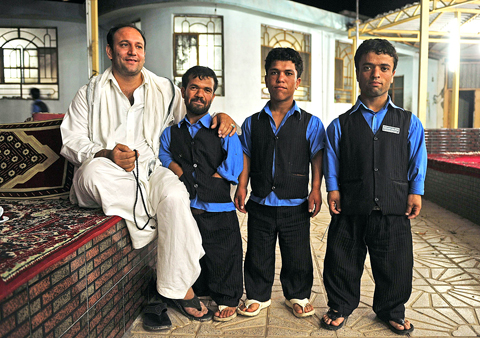High on a hill overlooking the western Afghan city of Herat is A Thousand and One Nights, a popular restaurant where enormous platters of steaming rice and juicy kebabs are served by dwarves.
As the famous hot winds of late summer blow through the restaurant’s open pavilion, the lights of Afghanistan’s center of culture twinkle far below and diners, mostly men, recline on divans covered in handmade carpets.
Fragrant smoke from sheeshas, the tall hubbly-bubbly pipes with flavored tobacco, scents the air as the massive meals are washed down with pots of black tea sipped through cubes of sugar.

PHOTO: AFP
This is Herat’s prime location, above the university campus and not far from the US consulate being built in a former hotel and due to open next year.
However, it is the waiters who draw the most attention.
Abdul Jabber Mohammad, 19, 30-year-old Burhan and Abdul Rahman, 18, stride between the divans in their uniforms of bright blue shirts, black trousers and striped waistcoats.
Each standing barely 1.2m tall, the waiters hoist huge round trays onto their shoulders and carry the sheesha pipes high to prevent the sparks blown from the embers burning their heads.
Diners stare and take photographs, nudge each other and point, but the three men say they don’t mind. Indeed, they all agree, they love it here.
“I’m very happy here. I’ve got a job, I’m earning money and I’m supporting my whole family,” Mohammad said.
Despite being able-bodied, the three men are classified by the government as disabled, though they are not entitled to any of the benefits that go to, for instance, war veterans who have lost limbs.
“The government does nothing for us,” Mohammad said. “So if we can’t find a job and earn our own living, we’re on our own.”
Attitudes toward people perceived as disabled in Afghanistan are mired in tradition and religion, with old Persian texts referring to physical and intellectual disabilities as having been bestowed by God.
As a result, disabled people are treated with affection, and the waiters at A Thousand and One Nights say they do not regard the attention they receive as either hostile or unwelcome.
“They are not seen as disabled, but can sometimes be the brunt of jokes and often are not taken seriously,” said Barez Ainak, who runs the restaurant. “I decided to have the dwarves working here because they couldn’t get good jobs anywhere else. I thought it would be an amusing talking point for my customers as they are very friendly and get on well with everyone.”
“It is good for them and it is good for us. For them, it’s a proper job and they love it here, people love them and they are happy,” he said.
As patronizing as Ainak’s words might sound to Western ears, he speaks with honesty and respect, saying he hired the three men because he knew it could be difficult for them to get work elsewhere simply because of their stature.
He is proud the waiters are happy and healthy, and says that he would hire as many dwarves as he could because everyone wins.
Mohammad — the oldest of six siblings and the only one “not normal height,” he said — agreed, saying: “I’ve never felt anything negative from anyone here and I think it’s because I have a job, and I obviously enjoy it and work hard.
“At school sometimes my friends would make fun of me and even now some uneducated people make jokes or pass comment, but we just ignore it,” he said.
Herat, capital of the eponymous province, is heavily influenced by Persian culture, a city where the old courtesies have been ingrained for centuries. The city, 150km from the Iran border, was settled 5,000 years ago on a fertile plain that made it the region’s breadbasket. When Alexander the Great passed through in the third century BC, Herat was a thriving Silk Road trading center renowned for its carpets, crafts and architecture. By the 15th century, Herat had blossomed into a center of poetry and literature.
Like elsewhere in Afghanistan — one of the world’s poorest countries, exhausted from 30 years of war, lacking infrastructure and industry — unemployment is high and prospects are few.
Mohammad was determined to finish secondary school, he said, because he believed in the importance of learning in a city famous for its poets and intellectuals.
Body-building was his hobby, he said, explaining his broad shoulders and strong arms.
After finishing his studies, “the culture ministry wanted me to work as a clown on stage, which I thought would have been embarrassing, shameful.”
“My uncle came here to eat one evening, he saw the other guys working here and so he told the manager about me. That was a year ago,” Mohammad said.
Abdul Rahman has been working at A Thousand and One Nights for five months and says he wasn’t confident of finding good work when he finished school.
“It’s great,” he said, his arm around the taciturn Burhan, the veteran with three-and-a-half years at the restaurant. “The three of us are best friends, so it is just great that we can all be here together.”

Philippine President Ferdinand Marcos Jr has fired his national police chief, who gained attention for leading the separate arrests of former Philippine president Rodrigo Duterte on orders of the International Criminal Court and televangelist Apollo Carreon Quiboloy, who is on the FBI’s most-wanted list for alleged child sex trafficking. Philippine Executive Secretary Lucas Bersamin did not cite a reason for the removal of General Nicolas Torre as head of the 232,000-member national police force, a position he was appointed to by Marcos in May and which he would have held until 2027. He was replaced by another senior police general, Jose

STILL AFLOAT: Satellite images show that a Chinese ship damaged in a collision earlier this month was under repair on Hainan, but Beijing has not commented on the incident Australia, Canada and the Philippines on Wednesday deployed three warships and aircraft for drills against simulated aerial threats off a disputed South China Sea shoal where Chinese forces have used risky maneuvers to try to drive away Manila’s aircraft and ships. The Philippine military said the naval drills east of Scarborough Shoal (Huangyan Island, 黃岩島) were concluded safely, and it did not mention any encounter with China’s coast guard, navy or suspected militia ships, which have been closely guarding the uninhabited fishing atoll off northwestern Philippines for years. Chinese officials did not immediately issue any comment on the naval drills, but they

POWER CONFLICT: The US president threatened to deploy National Guards in Baltimore. US media reports said he is also planning to station troops in Chicago US President Donald Trump on Sunday threatened to deploy National Guard troops to yet another Democratic stronghold, the Maryland city of Baltimore, as he seeks to expand his crackdown on crime and immigration. The Republican’s latest online rant about an “out of control, crime-ridden” city comes as Democratic state leaders — including Maryland Governor Wes Moore — line up to berate Trump on a high-profile political stage. Trump this month deployed the National Guard to the streets of Washington, in a widely criticized show of force the president said amounts to a federal takeover of US capital policing. The Guard began carrying

Ukrainian drone attacks overnight on several Russian power and energy facilities forced capacity reduction at the Kursk Nuclear Power Plant and set a fuel export terminal in Ust-Luga on fire, Russian officials said yesterday. A drone attack on the Kursk nuclear plant, not far from the border with Ukraine, damaged an auxiliary transformer and led to 50 percent reduction in the operating capacity at unit three of the plant, the plant’s press service said. There were no injuries and a fire sparked by the attack was promptly extinguished, the plant said. Radiation levels at the site and in the surrounding